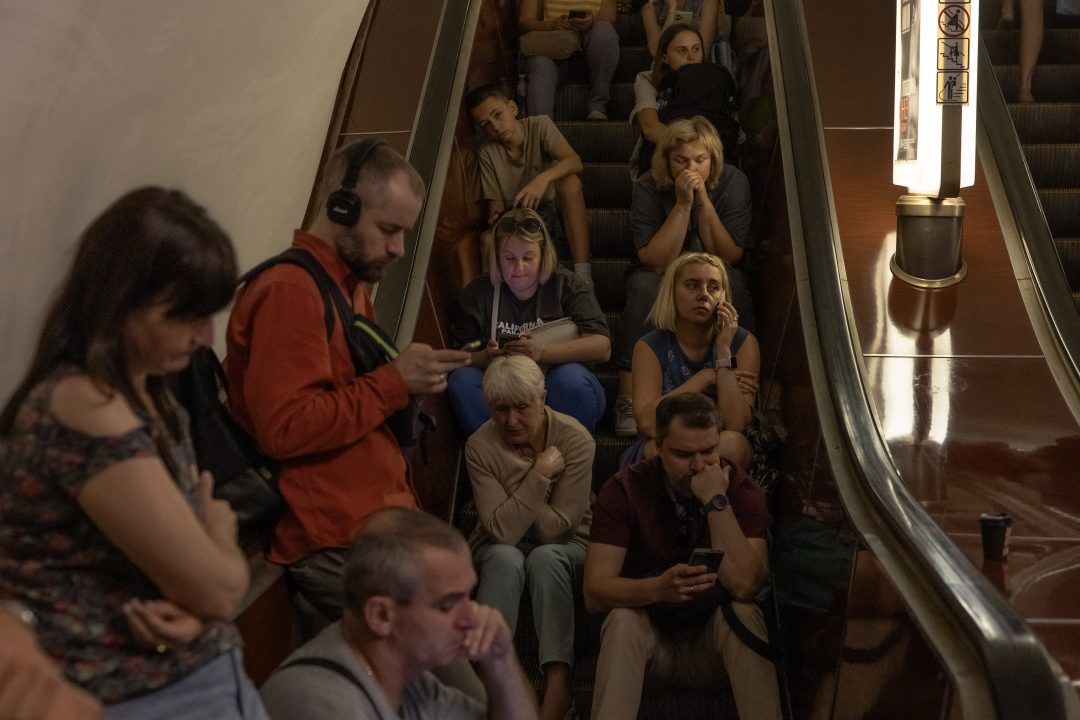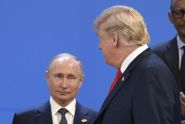- Home
- Middle East
- UN Nuclear Watchdog Chief Visits Kursk Nuclear Plant

©People take shelter in the Teatralna metro station during a Russian air attack, in Kyiv, on August 26, 2024, amid the Russian invasion of Ukraine. Russian drones and missiles on August 26, 2024. Roman PILIPEY / AFP
UN nuclear watchdog head Rafael Grossi kicked off a visit on Tuesday to "independently assess" conditions at Russia's Kursk nuclear plant following Ukraine's unprecedented cross-border offensive into the Russian region.
Russia fired hundreds of drones and missiles at Ukraine on Monday, killing at least four people and battering the country's already weakened energy grid, officials said.
A spokesperson for Russia's nuclear agency, Rosatom, told AFP that Rossi had arrived at the power plant as he personally leads a mission to assess the situation there, which he has warned is "serious."
The IAEA confirmed that it had been told by Russian authorities that drone fragments were found last Thursday roughly 100 meters from the Kursk plant's spent nuclear fuel storage facility.
Grossi said on Monday he would "independently assess what is happening" at the plant, "given the serious situation."
The plant lies some 60 kilometers from the Russia-Ukraine border, next to the Seym river, and less than 50 kilometers away from Kursk city, the region's capital with a population of around 440,000.
Robert Kelley, a former IAEA director of inspections, said, "The possibility of a Chernobyl-type incident with the reactor blowing up and burning for days is zero."
But he added that an errant bomb or large artillery strike on spent fuel storage ponds could damage the fuel and release radioactive gases and particles.
The IAEA urged both Russia and Ukraine to exercise "maximum restraint" to "avoid a nuclear accident with the potential for serious radiological consequences."
On Monday, President Volodymyr Zelensky said Moscow launched at least 127 missiles and 109 drones in "one of the largest Russian attacks."
Of those, 102 missiles and 99 drones were shot down, according to Ukrainian Air Force Commander Mykola Oleshchuk, who described it as Russia's "most massive" attack.
State-owned electricity supplier Ukrenergo announced emergency power cuts to stabilize its system following the barrage, while train schedules were disrupted.
The Russian Defense Ministry confirmed it hit energy facilities in a statement, claiming that they were being used to aid Ukraine's "military-production complex."
NATO member Poland said its airspace was violated during the barrage, probably by a drone.
Army command spokesman Jacek Goryszewski said it was "highly likely that it could have been a Shahed-type drone" of Iranian design, used by the Russian military.
Zelensky called for European air forces to help Kyiv down drones and missiles in the future.
With AFP
Russia fired hundreds of drones and missiles at Ukraine on Monday, killing at least four people and battering the country's already weakened energy grid, officials said.
A spokesperson for Russia's nuclear agency, Rosatom, told AFP that Rossi had arrived at the power plant as he personally leads a mission to assess the situation there, which he has warned is "serious."
The IAEA confirmed that it had been told by Russian authorities that drone fragments were found last Thursday roughly 100 meters from the Kursk plant's spent nuclear fuel storage facility.
'Serious Situation'
Grossi said on Monday he would "independently assess what is happening" at the plant, "given the serious situation."
The plant lies some 60 kilometers from the Russia-Ukraine border, next to the Seym river, and less than 50 kilometers away from Kursk city, the region's capital with a population of around 440,000.
Robert Kelley, a former IAEA director of inspections, said, "The possibility of a Chernobyl-type incident with the reactor blowing up and burning for days is zero."
But he added that an errant bomb or large artillery strike on spent fuel storage ponds could damage the fuel and release radioactive gases and particles.
The IAEA urged both Russia and Ukraine to exercise "maximum restraint" to "avoid a nuclear accident with the potential for serious radiological consequences."
'Very Scary'
On Monday, President Volodymyr Zelensky said Moscow launched at least 127 missiles and 109 drones in "one of the largest Russian attacks."
Of those, 102 missiles and 99 drones were shot down, according to Ukrainian Air Force Commander Mykola Oleshchuk, who described it as Russia's "most massive" attack.
State-owned electricity supplier Ukrenergo announced emergency power cuts to stabilize its system following the barrage, while train schedules were disrupted.
The Russian Defense Ministry confirmed it hit energy facilities in a statement, claiming that they were being used to aid Ukraine's "military-production complex."
Poland Airspace 'Violation'
NATO member Poland said its airspace was violated during the barrage, probably by a drone.
Army command spokesman Jacek Goryszewski said it was "highly likely that it could have been a Shahed-type drone" of Iranian design, used by the Russian military.
Zelensky called for European air forces to help Kyiv down drones and missiles in the future.
With AFP
Read more



Comments